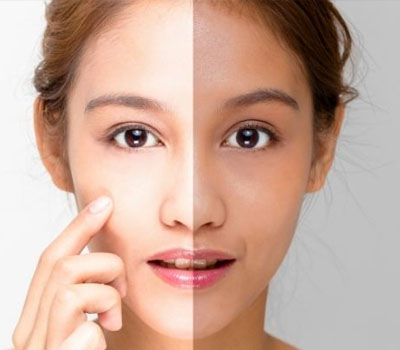Skin Lightening Treatment
- Home
- Skin Lightening Treatment

Skin Lightening Treatment
Skin lightening treatments are procedures or products designed to reduce hyperpigmentation, dark spots, or uneven skin tone. It's important to approach these treatments with caution, ensuring they are safe and tailored to individual skin needs. Here are some common skin lightening options:
Topical Agents:
- Topical Lightening Creams: Products containing ingredients like hydroquinone, kojic acid, arbutin, or vitamin C can help reduce hyperpigmentation when applied to the skin. It's crucial to use these under the guidance of a dermatologist to avoid side effects.
Chemical Peels:
- Chemical peels: A dermatologist applies a chemical solution to the skin, causing it to peel and regenerate. This can help improve skin tone and reduce dark spots.
Laser Therapy:
- Laser Skin Resurfacing: Lasers can target and break down pigmented areas, promoting collagen production and improving overall skin tone. This is effective for conditions like melasma or sun damage.
Microdermabrasion:
- Microdermabrasion: This exfoliation technique removes the top layer of skin, helping to reduce hyperpigmentation and reveal brighter skin underneath.
Cryotherapy:
- Cryotherapy: Involves freezing dark spots or pigmented areas with liquid nitrogen, causing them to peel off. It's often used for small spots or warts.
Injectable Treatments:
- Intravenous Glutathione: Some individuals use intravenous glutathione, an antioxidant, for skin lightening. However, this is a controversial and unproven practice with potential risks.
Oral Medications:
- Oral Tranexamic Acid: In some cases, oral medications like tranexamic acid may be prescribed to reduce hyperpigmentation. These should only be taken under the guidance of a healthcare professional.
Natural Remedies:
- Natural Ingredients: Some natural ingredients like licorice extract, mulberry extract, or aloe vera are believed to have skin-lightening properties. However, their effectiveness varies, and caution is advised.
Sun Protection:
- Sunscreen: The most crucial aspect of any skin lightening regimen is sun protection. UV exposure can worsen hyperpigmentation. Regular use of broad-spectrum sunscreen is essential.
Consultation:
- Before undergoing any skin lightening treatment, it's crucial to consult with a dermatologist or qualified skincare professional. They can assess your skin, discuss your goals, and recommend the most suitable and safe options.
Important Considerations:
- Side Effects: Some treatments may have side effects, including irritation, redness, or worsening pigmentation. A professional's guidance helps minimize risks.
- Patience: Skin lightening is a gradual process, and consistent use of products or adherence to treatment plans is necessary.
- Individual Variability: Results can vary based on individual skin types, conditions, and responsiveness to treatments.
Skin lightening treatments should prioritize skin health and safety. Always seek guidance from a qualified healthcare professional before starting any regimen, and be cautious of unregulated or potentially harmful products or practices.

